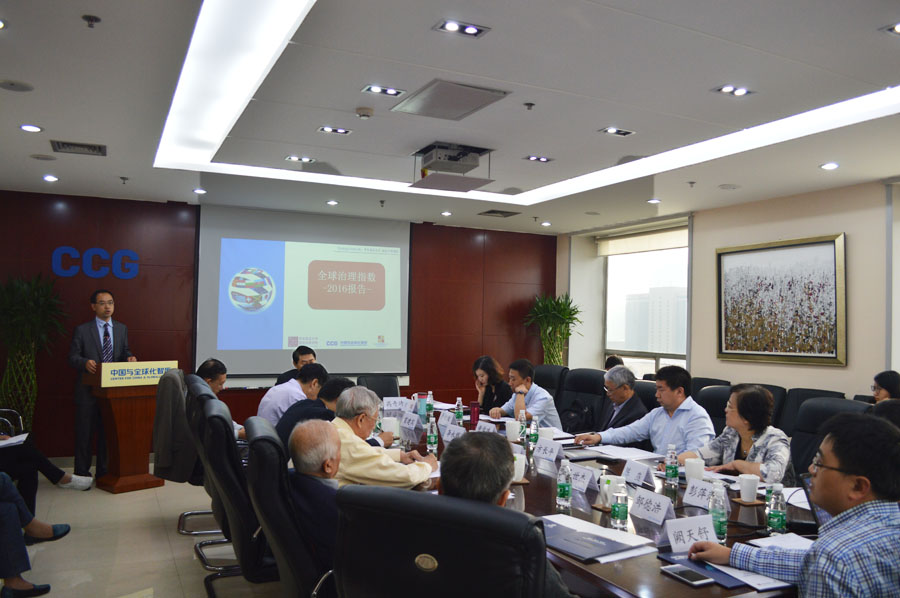Global governance, international organizations, regional cooperation and the Belt and Road Initiative (BRI) are key subjects of CCG's globalization research. As China's first think tank named and dedicated to globalization, CCG founded the China and Globalization Forum and contributes to international discussions related to globalization. It has organized seminars under themes such as WTO reform, multilateral governance, and the BRI. CCG was the first body to hold a BRI-themed event at the Munich Security Conference, a world-leading conference in the field of international security and governance.
Based on years of research in the field of globalization, CCG has published numerous research reports and books, including Win-Win International Cooperation and Path to Achievement of the Belt and Road, Globalization and Anti-Globalization and What’s Next for Globalization? Great Changes and China’s Proposed Approaches. The Handbook on China and Globalization published by Edward Elgar Publishing is one of the few books published in English by a Chinese think tank with an authoritative international academic publisher. Two of the CCG's initiatives were selected for inclusion in the first Paris Peace Forum, pioneering a new model for Chinese think tanks to fully participate in global governance and international cooperation. In addition, CCG has long-term cooperation with the WTO, UN, OECD, World Bank, IMF and many other international organizations, international think tanks and related institutions.
-

Wang Huiyao: New green consensus can revive multilateral mindset
In recent years, images of trash-strewn seas and beaches have led to growing calls to tackle marine plastic waste. At the G20 Summit in June in Osaka, Japan, leaders moved to start addressing the issue with a major agreement to eliminate pollution by marine plastic litter by 2050.
August 07 , 2019 -

Harvey Dzodin: Conference illustrates importance of dialogue
Participating in the Dialogue of Asian Civilizations last week was a highlight of my year. It was a rich experience in every respect, from people-to-people exchanges to formal and informal information-sharing. True to its theme of “exchanges and mutual learning among Asian civilizations and a community with a shared future”, there was an abundant flow of ideas and information. I even found healthy dollops of idealism and optimism at a time when there is so much global cynicism and zero-sum thinking in our world.
August 06 , 2019 -

Wang Huiyao: In an age of Globalization 4.0, no country can stand aloof
The 55th Munich Security Conference was held from February 15 to 17. This conference, known as “Davos in the defense field,” has now developed into one of the important annual forums in the field of international strategy and security. It is an important platform for senior defense officials and experts of various countries to state their positions and exchange views on major international security issues.
June 11 , 2019 -

CCG Releases New Report on State Participation in Global Governance
A new report entitled “2016 States’ Participation Index of Global Governance World Report” was released on Sept. 22 at CCG. This report is a joint effort by Center for China and Globalization, Political Science Institute of East China University of Political Science and Law, and Center for International Communications Studies at China International Publishing Group.
June 05 , 2019 -

He Weiwen: How Trump’s Extreme Pressure on China is Backfiring
US President Donald Trump said recently on Twitter that Huawei could be part of a potential trade deal. In other words, America’s recent outright ban on Huawei was not truly done for national security reasons — there was no evidence supporting the allegations — but rather as a bargaining chip to help get “a great deal” with China. Immediately after announcing the US tariff hike on $200 billion of Chinese goods from 10% to 25% starting May 10, and the subsequent US Trade Representative’s release of the list of $ 325 billion of Chinese goods subject to 25% tariffs, US Treasury Secretary Steve Mnuchin expressed willingness to continue talks with China. All of the above leads people to think that this latest and much larger stick is also part of Trump’s “art of the deal” — extreme pressure to produce the best deal possible. It also provides an explanation for the recent abrupt suspension of China-US trade talks: the US government wants much more. It thus made the stick much bigger, then asked for talks while pressing for a decisive Chinese defeat, that ensures a comprehensive US-China trade deal would be in America’s favor.
May 31 , 2019


